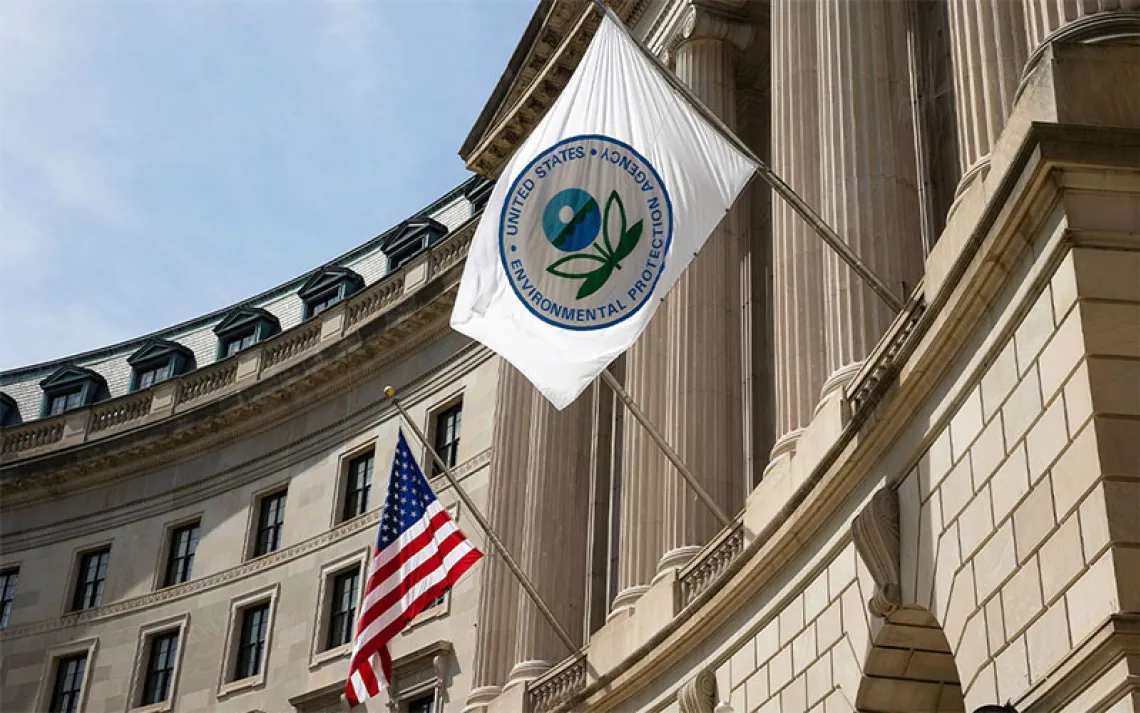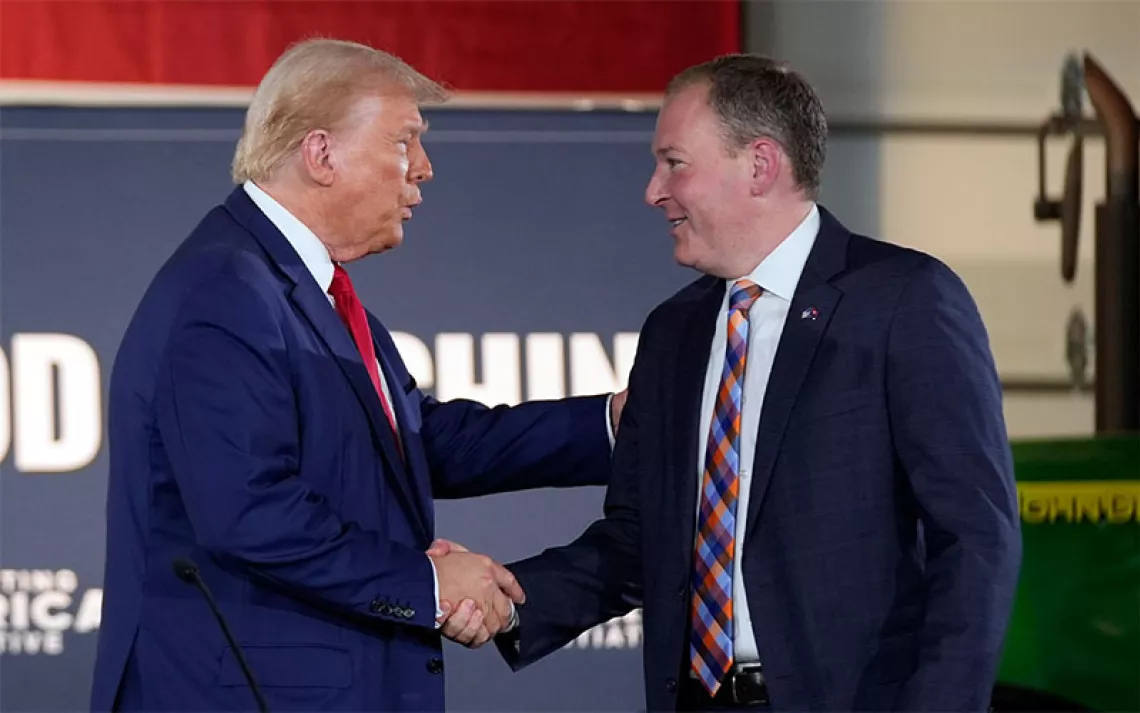The Lobbyists Are in Charge Now
Pruitt, Zinke took favors from lobbyists and were replaced...by lobbyists

Left: Andrew Wheeler | Photo by Michael Holahan/Associated Press. Right: David Bernhardt | Photo by David Zalubowski/Associated Press
Before the Trump administration put them in charge of the Department of the Interior and the Environmental Protection Agency, respectively, Ryan Zinke was a Montana congressman and Scott Pruitt was the attorney general for Oklahoma. Both of them resigned last year, under suspicion of accepting favors from lobbyists for precisely those industries that Pruitt and Zinke were charged with regulating.
Now, Pruitt has been replaced by . . . Andrew Wheeler, a former lobbyist for precisely those industries that the EPA and the Interior are supposed to regulate. Pending confirmation by the Republican-controlled Senate, Zinke will be replaced by a lobbyist as well.
David Bernhardt—who was Zinke’s former deputy and is currently running the Department of the Interior—worked at the Interior Department under George W. Bush. But more recently, he worked for the law firm Brownstein Hyatt Farber Schreck. Bernhardt delisted himself as a lobbyist in November 2016, right after the results of the presidential election.
During his time at Brownstein Hyatt Farber Schreck, Bernhardt represented oil and gas companies, fossil fuel trade groups, the water district for the agricultural heavy-hitters in the San Joaquin Valley, and mining companies against different agencies in the Department of the Interior, including the Bureau of Land Management, the Bureau of Ocean Energy Management, and the Fish and Wildlife Service. (A list of Bernhardt’s past clients can be found on page 144 in these Senate confirmation hearing documents.) At the time, Bernhardt lobbied for oil companies like Cobalt International Energy, challenged deep-water drilling rules in the Gulf of Mexico, and lead a lawsuit challenging the Interior Department’s decision to deny permits for oil and gas exploration in the Arctic National Wildlife Refuge.
Andrew Wheeler, who before his recent confirmation also ran the EPA in Pruitt's absence, was once a legislative aide in Congress, where he worked for Senator Inhofe, a vociferous climate change denier who famously brought a snowball onto the Senate floor to deride global warming. But most recently, Wheeler lobbied for years on behalf of Murray Energy, the largest coal company in the United States.
From Suing the Department of the Interior to Running the Department of the Interior
There are no signs yet of the obvious graft that Pruitt and Zinke appear to have been engaged in—no suspiciously affordable apartments in Capitol Hill or microbreweries—but the work that Bernhardt and Wheeler have been doing at their respective agencies has so far been remarkably favorable toward their former clients.
At the Interior Department, Bernhardt advanced the Trump administration’s proposal to open vast swaths of federal waters to offshore drilling and supervised opening new expanses of public land to oil and gas development, including millions of acres of threatened sage-grouse habitat. Email records indicate that while Bernhardt was deputy he was also involved in attempts to challenge the 50-year-old Migratory Bird Treaty Act, a bipartisan rule that prosecutes and fines companies that inadvertently kill birds.The move was lobbied by oil trade groups, including International Petroleum Association of America, a former client of Bernhardt—which seems to be a clear conflict of interest. Eight states are currently suing the government to restore protections for migratory birds.
Bernhardt has also worked on protections for Chinook salmon and delta smelt, a finger-size fish endemic to California estuaries, even though, before becoming deputy director at the Interior, Bernhardt lobbied to weaken ESA protections for the fish on behalf of a water district seeking more irrigation for farmland. This hostility toward the Endangered Species Act maps with broader Republican efforts to undermine the rule. In July of last year, the Interior and Commerce Departments released a joint proposal to modify the Endangered Species Act by weighing “economic considerations” in deciding whether to list a species.
Under Bernhard’s leadership in December of last year, the Interior Department proposed new rules to limit and slow Freedom of Information Act requests. The agency also continued to work on oil and gas permits during the government shutdown, when only essential services—such as emergency response, fire prevention, and law enforcement—were being funded.
In written answers to questions from the Senate Committee on Energy and Natural Resources, Bernhardt seemed to perceive his actions at the Department of the Interior as even-handed. He wrote that he favors an “all of the above energy approach,” and when asked about transitioning the country away from fossil fuels, added, “The role of the Department of the Interior is to make energy resources on federal lands available for development, as appropriate; it is not to select winners and losers among energy sources.”
Though Bernhardt is backed by congressional Republicans, Democrats in both houses have repeatedly raised questions about the conflicts of interest posed by his lobbyist past, as well as the discrepancies and omissions in his meetings calendar while at the Interior. CNN reported these to be some 150 vague entries over 11 months, which mentioned meetings or phone calls but not who they were with.
Big Coal’s Man at the EPA
Andrew Wheeler’s transition from coal lobbyist to EPA official was helped along by two Republicans on the Senate Committee on Environment and Public Works—Wheeler’s former boss, Jim Inhofe (R-Okla.) and John Barrasso (R-Wyo.). In 2017, according to documents obtained by the Intercept, Wheeler held campaign fundraisers for both Republicans. A year later, both senators voted to advance Wheeler’s nomination—to deputy administrator in November 2018, and later, to administrator in 2019.
Since joining the EPA under Zinke, Wheeler’s tenure has been a windfall for his former coal industry clients. Wheeler has pushed to slash waterway protections that were put in place to protect streams and wetlands from chemical pollutants. He’s worked on replacing the Clean Power Plan, Obama’s landmark 2014 law to rein in greenhouse gas emissions, with a much-watered-down Affordable Clean Energy Rule. The new rule would leave authority to regulate greenhouse gas emissions from power plants to individual states. An often-cited Harvard School of Public Health study concluded that the change would actually increase CO2 emissions in 18 states and harmful pollutants in 20 states.
Wheeler worked on the EPA’s recent decision not to regulate the amount of PFAS, a class of industrial chemical in flame retardants and cookware linked to kidney and testicular cancer, in waterways. After Wheeler met privately with those Republicans who expressed concerns about PFAS’s dangers, he was confirmed.
His enthusiasm in rolling back regulations has even, in some cases, gone against the wishes of industry stakeholders. Wheeler moved to relax the 2012 Mercury and Air Toxics Standards, which require power plants to install emissions “scrubbers” that reduce mercury pollution. The standards were put in place under the Obama administration, and at the time, utilities lobbied heavily against the rule. But now that the changes have been in effect for years, even utilities have argued against the administration’s proposed rollback.
Wheeler has defended the administration’s move to challenge California’s high fuel-efficiency standards, which has set the EPA up for legal battles with the state. While many automakers initially opposed the standards, many voiced support for them after the plan to challenge the standards was released.
An Administration of Lobbyists
For a president who vowed to “drain the swamp,” the revolving door between corporate lobbying and regulatory agencies spins full tilt. According to a March 2018 report by ProPublica, at least 187 political appointees had previously worked as federal lobbyists, many of whom regulated the same industries that they had previously represented. On February 20th, the Campaign Legal Center, a public watchdog group, filed a complaint against six former lobbyists in the Department of the Interior with prior ties to the NRA and the Heritage Foundation among others.
The Trump administration ethics pledge shares many characteristics with previous administrations. It requires, for example, government officials to shy away from “particular matters involving former employers or clients” for two years. It also requires officials to not lobby for five years after leaving government.
But, any administration also has the power to grant an ethics waiver to any candidate that it favors. The Trump administration initially resisted making its ethics waivers public, but when it did, it revealed that during the first four months of his presidency, the Trump administration granted five times as many ethics waivers as the Obama administration. Bernhardt, in his confirmation hearing, acknowledged point blank that he would not have qualified to head the Interior under the Obama administration’s lobbying rules.
As of March 2018, at least 24 ethics waivers had been granted to top White House officials. And, according to reporting by ProPublica, at least eight former Trump administration officials had returned to lobbying by May 2018, in spite of the prohibition against lobbying immediately after spending time at a government agency. Ryan Zinke, even with the numerous scandals preceding his resignation, is reportedly now joining Turnberry Solutions, a lobbying firm based in Washington, D.C.
This article has been updated to reflect Andrew Wheeler's confirmation as EPA head by the Senate.
 The Magazine of The Sierra Club
The Magazine of The Sierra Club



